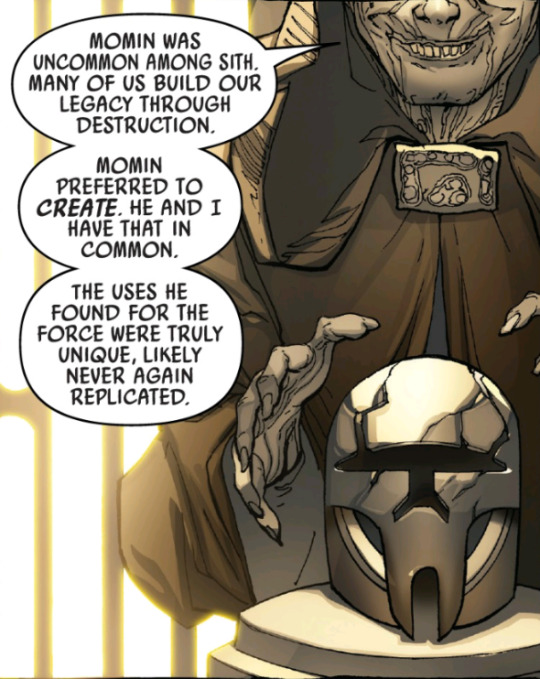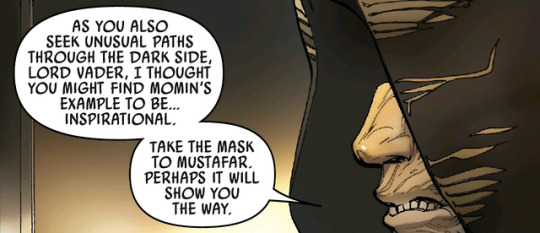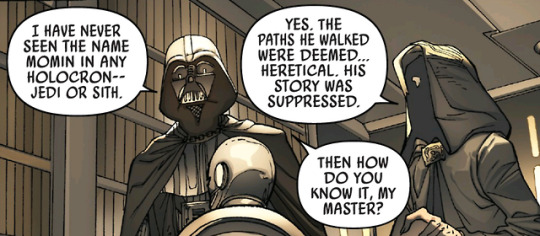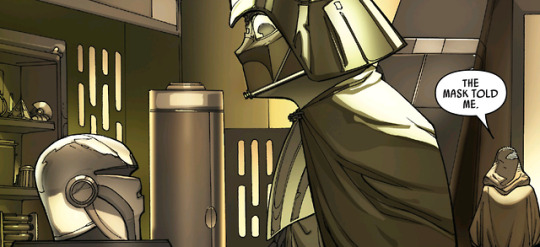#philosophies of darth thraw
Explore tagged Tumblr posts
Text
The Sith and their passions
Far too often the Sith are extreme reactionary to the ways of the Jedi, taking up a point of contestation not because of the belief or its validity but simply because it is contrary to Jedi teachings. This does not mean that there are not important truths in such teachings, glimmers of great understanding hidden by petty contempt.
One such example is the maxim that initiates the Sith code
“Peace is a lie, there is only passion.”
Throughout the galaxy and history this statement is proven true. All peace is fleeting, existing for moments before being snuffed out and replaced with conflict. This is because conflict is the natural order of the Force itself and the Force resides in and connects all things. On all levels of life conflict of some sort drives existence, those who achieve the peace to permanently suspend conflict become locked in a trance like state to wither and die without action. While their heart still beats it is foolish to consider that living and is an abhorrent crime against the Force.
The failure of the Sith in this matter is not the truth of the statement but instead the use of it as an excuse to entirely give in to and lose one’s self to their passion. In this manner the Jedi also have a sliver a truth hidden amongst their idealist dogma. Control of one’s passions is essential, though the avoidance of having passions that the Jedi attempt to exhibit is also fallacy.
Instead it should be one’s goal to accept their passions and then control them to be harnessed as needed to maximize the associated affect. This is true for all passions and emotions, from the pure power of wrath to the subtle influences of love. They all have their time and their place, they are all useable to serve one’s goals and ambitions. But they also all carry the risk of being lost to the passions itself.
It is in this way previous Sith have failed to maximize their potential in their passions or to understand the truth they already held dear.
#sith#star wars#darth#sith warrior#dark side#dark side of the force#sith philosophy#aspects of power#philosophies of Darth Thraw#Darth Thraw#sith inquisitor#not swtor#dark lord of the sith#sith code#jedi
11 notes
·
View notes
Photo
I think there are a few general Sith things to note, starting with the difference between individualism and selfishness. Sith ideology focuses heavily on the individual. With the Jedi there is little difference between the whole and each individual, to a Sith this is akin to a beehive where all are more or less the same. Drones whose nature is to disappear into the whole.
For the Sith there is a much more prevelant focus on the individual. If you’re a drone you might as well hand over your lightsaber, cut yourself off from the force, and become a slave. You’ll be of more use to the whole than as a Sith Lord. This ideology easily leads to selfishness and is easier to conflate as selfishness even when that is not the case.
Before an example of this let’s discuss how this relates to power, knowledge, and the effects this has on culture. It’s is commonly said that Knowledge is power, this is not true. Power, or the power of will, is power. Knowledge, wealth, strength, etc. can not replace this regardless of the quantity. But true power will grasp onto anything it can and with whatever resources are available can accomplish great things. Instead of being power itself these are tools useable by actual power to accomplish it’s ends.
Sith are very power centric, individual power and the support of it’s tools being an important aspect of this. There is, coupled with keeping an apprentice from becoming powerful enough to overcome the master, the idea that the tools of power should be gained individually. As in the case of Lord Momin’s helm. Contrary to a few assumptions noted here Sideous is providing Vader with greater knowledge, or more the path to it. It is Vader’s responsibility to gain the knowledge for himself, he must express the power of will to gain the tool and walk on the backs of previous Sith like Mamon, it is not for Sideous to just give it to him.
Knowledge is/was horded to extend the time before an apprentice was strong enough to overcome the master, there is selfishness in this but this was, in truth both to the apprentice’s advantage as well as not the only reason. This relates to what @thewillowbends mentioned of once you are the master many Sith feel they have nothing else to learn. A Sith who overcomes their master ends up generally stunted, typically using power of will the many tools the master has collected over time are lost. The apprentice looses access to them and a sliver of culture dies. These Sith are short sighted fools who do not deserve the title, a personal opinion.
It is hard to see, the conflict inherent to the dynamic obscuring it, but it is a symbiotic relationship. The master wanes in power but extends the reach of their tools. The apprentice grows in power and, if they are worth the title, learn to annex their master’s tools as well as how to grow more. As Bane taught in the rule of two an apprentice is that which grows beyond us propelling the Sith goal, culture, and legacy forward.
On that note let us examine the aforementioned Rule of Two. Darth Bane, after creating the rule of two, heavily warned against this ultimate hoarding of knowledge. He knew that it was necessary to the dynamic of Sith master/apprentice, but was ultimately bad for future Sith in a single line format. He actively urged master’s to share the paths to knowledge and other tools at a higher rate while working to maintain the balance of master overcome by apprentice.
With Darth Sideous the rule of two was fulfilled, making it a piece of Sith culture that serves more minor purposes.
As for Vader, Palpatine, and Mustafar: it is not because no Padme means Vader would better chained to Palpatine but because either way Vader will become stronger for the experience. Vader was a disappointment to Palpatine, even if Palpatine did not believe he would never be replaced Vader would not be the one to do it. His failure on Mustefar damaged him severely, and more than physically. He was still strong but he would never be what he was let alone what he could be. Unlike Dooku, Vader had been intended to be more than simply an enforcer tool, an apprentice worth replacing Sidious should he actually fall. But with Vader’s fall that was all gone, and so an enforcer tool is what Vader became. Thus the many faux-apprentices constantly pushing Vader to prove he deserved the position.
Sideous still treated him as a proper apprentice in many ways, such as putting him on the path to knowledge. As both an apprentice and a tool what strengthens Vader strengthens Sideous. This is something that remains true for Jedi as well. Though it must be said they rarely intentionally recognize this, let alone take advantage of it. Resulting in not pushing their apprentice to be all they could be but instead what the master thinks they should be.
I do have to say that, despite some vaguely biased and ignorant of Sith culture comments, the Sith do not intentionally destroy their own culture. Hoarding of the tools of power by master’s too often does lead to loss, and parts of culture that no longer serve a purpose are removed more often than Jedi. But that in-itself is part of our culture, as is the path to regaining those tools. These tools are not meant to just be handed down, if you want to walk on the backs of those before you as an individual must earn it.
As long as there are those who realize that there is no good or bad, just power and those too weak to seek it, our culture will live. You may not understand it, you may mock it or shame it from this place of ignorance, but it is ours. It has won us the galaxy before and nearly destroyed the Jedi. From a handful of exiles labeled heretics by the Jedi we have climbed from the pit of nothingness again and again. Sometimes we are pushed back but each time we climb higher than before and (if not for writers, good guys have to win, and the unrealistic obsession with the ‘light of hope no matter how dark’) eventually we will ultimately be victorious.
(Our of character: ‘you’ is meant as the Royal you with no one in mind or intent to target anybody. This section is written from the perspective of a post Galactic Empire Sith OC, I’m new to such RP and am still getting used to it. Thank you)





Darth Vader (2017-) #21 - Fortress Vader Part III - Written by Charles Soule - Art Layouts by Giuseppe Camuncoli - Art Finishes by Daniele Orlandini - Colors by David Curiel
#sith#sith philosophy#star wars#sith code#sithlord#philosophies of darth thraw#darth thraw#darth vader#darth sidious#palpatine#sheev palpatine#dark lord of the sith#darth#lord vader#Lord Mamon#dark jedi#sith culture#sith empire#galactic empire
965 notes
·
View notes
Text
The selfish act of attachments
Among force users it is widely known that the fear of loosing attachments can push one to the power of the Dark Side as a means of ‘protecting’ them. And yet it is that the Sith warn against attachments just as much as the Jedi, though supposedly for different reasons.
For a Sith the reason to abandon attachments, disposing of them if necessary, is their tendency to distract or hold back a Sith from accomplishing both personal goals and tasks that benefit the order. And should the attachment be removed by alternate means there is risk of the paralytic effects of sorrow. Instead attachments become good only to be cut off, gaining more power from the sacrifice. It is for these selfish reasons the Sith teach the removal of attachments.
The Jedi’s reasonings are essentially the same though shrouded in their typical ‘we do it for the good of the galaxy’ nonsense conflating what’s good for the galaxy with what is good for them falsely supposing they are inherently what is good for the galaxy. But I digress.
Attachments can distract from what is good for their order and can even be said to have been what led to their demise, somewhat legitimizing their fear of them. And thus it is that the Jedi’s reasonings for dismissal of attachments is just as selfish as those of any Sith, coupled with their ironic fear of the Dark Side.
We can therefor see that the removal of attachments, which are not limited to living beings but can include things such as my master’s many works of art and political gifts, is a selfish choice centered in putting other goals before that to which one is attached. From which one may be tempted to conclude that accepting attachments at the expense of personal goals or the goals of their order is then the selfless thing to do and thus somehow morally ‘right’. But this is also folly.
No one has an attachment because of what they do for that thing, though there generally is some benefit to that which is attached due to how it is thus cherished. No, it is not what we do for it but what it does for us. It is the feelings that we gain in return that keeps us attached, what we gain from the attachment. If we gained nothing there would be no reason to hold on to the attachment and it would naturally dissolve.
In the end all choices regarding attachments are selfish ones. As far as this subject goes there simply is no selfless paradigm that the Jedi would aim for, themselves no more than a facade of such a goal. Where attachments are concerned it is all a personal and selfish series of decisions.
#sith#sith philosophy#star wars#dark lord of the sith#dark side of the force#darth thraw#philosophies of darth thraw#darth#darth sidious#darth vader#attachment#selfish#dark side#sith code#sith inquisitor#sith warrior#not swtor#all the star wars tags
3 notes
·
View notes